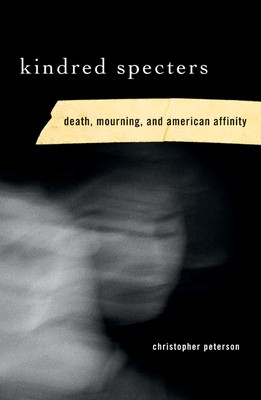
- We will send in 10–14 business days.
- Author: Christopher Peterson
- Publisher: University of Minnesota Press
- ISBN-10: 0816649847
- ISBN-13: 9780816649846
- Format: 15.3 x 22.6 x 1.2 cm, minkšti viršeliai
- Language: English
- SAVE -10% with code: EXTRA
Reviews
Description
The refusal to recognize kinship relations among slaves, interracial couples, and same-sex partners is steeped in historical and cultural taboos. In Kindred Specters, Christopher Peterson explores the ways in which non-normative relationships bear the stigma of death that American culture vehemently denies.
Probing Derrida's notion of spectrality as well as Orlando Patterson's concept of "social death," Peterson examines how death, mourning, and violence condition all kinship relations. Through Charles Chesnutt's The Conjure Woman, Peterson lays bare concepts of self-possession and dispossession, freedom and slavery. He reads Toni Morrison's Beloved against theoretical and historical accounts of ethics, kinship, and violence in order to ask what it means to claim one's kin as property. Using William Faulkner's Absalom, Absalom! he considers the political and ethical implications of comparing bans on miscegenation and gay marriage.
Tracing the connections between kinship and mourning in American literature and culture, Peterson demonstrates how racial, sexual, and gender minorities often resist their social death by adopting patterns of affinity that are strikingly similar to those that govern normative relationships. He concludes that socially dead "others" can be reanimated only if we avow the mortality and mourning that lie at the root of all kinship relations.
Christopher Peterson is visiting assistant professor of literature at Claremont McKenna College.
EXTRA 10 % discount with code: EXTRA
The promotion ends in 22d.00:43:07
The discount code is valid when purchasing from 10 €. Discounts do not stack.
- Author: Christopher Peterson
- Publisher: University of Minnesota Press
- ISBN-10: 0816649847
- ISBN-13: 9780816649846
- Format: 15.3 x 22.6 x 1.2 cm, minkšti viršeliai
- Language: English English
The refusal to recognize kinship relations among slaves, interracial couples, and same-sex partners is steeped in historical and cultural taboos. In Kindred Specters, Christopher Peterson explores the ways in which non-normative relationships bear the stigma of death that American culture vehemently denies.
Probing Derrida's notion of spectrality as well as Orlando Patterson's concept of "social death," Peterson examines how death, mourning, and violence condition all kinship relations. Through Charles Chesnutt's The Conjure Woman, Peterson lays bare concepts of self-possession and dispossession, freedom and slavery. He reads Toni Morrison's Beloved against theoretical and historical accounts of ethics, kinship, and violence in order to ask what it means to claim one's kin as property. Using William Faulkner's Absalom, Absalom! he considers the political and ethical implications of comparing bans on miscegenation and gay marriage.
Tracing the connections between kinship and mourning in American literature and culture, Peterson demonstrates how racial, sexual, and gender minorities often resist their social death by adopting patterns of affinity that are strikingly similar to those that govern normative relationships. He concludes that socially dead "others" can be reanimated only if we avow the mortality and mourning that lie at the root of all kinship relations.
Christopher Peterson is visiting assistant professor of literature at Claremont McKenna College.


Reviews